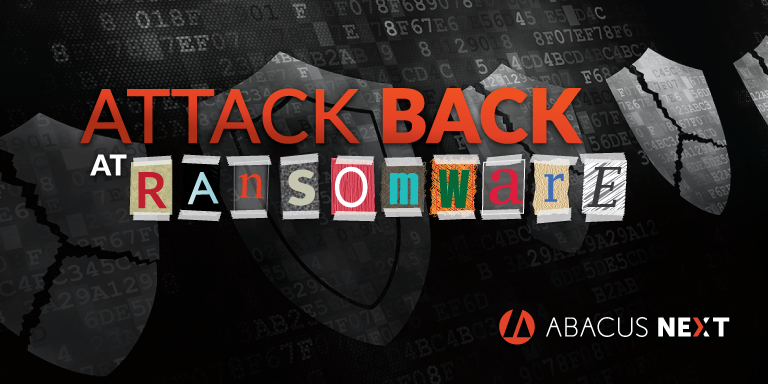Attack Back at Ransomware


Here at Abacus, we are obsessed teaching you how to protect your data and your firm against cyber threats – from malware to viruses to hackers – but lately, we have had a laser-like focus onransomware.
If you’ve been following our blog recently, you’ll see we’ve been spending a lot of time talking about ransomware (for those a little behind, click here, here, and here).
To recap: Ransomware has become a multimillion-dollar crime operation that strikes everyone from lawyers to hospitals to police departments to your family members. While ransomware is different depending on the malware, the attack is simple: once a computer has been infected the software blocks access to the computer’s system until a sum of money is paid, usually in bitcoins. If the victim is not able to pay, the malware is designed to steal and delete your data, rendering your computer useless. Your files – family photos, tax documents, business files – are gone forever.
What makes ransomware scary, however, is its rapid growth and profitability:
- It’s so profitable, in fact, that FBI Special Agent Chris Christopherson was quoted in a recent San Diego Union-Tribune article that “It’s entirely possible that we’ll have far in excess of $1 billion in losses” in 2017 alone.
- Between January and September ransomware attacks increased by 300%, affecting nearly one if five businesses worldwide.
- The FBI has reported that about 4,000 computers around the world are infected every hour.
- Experts have identified over 190 types of ransomware (and that number is growing)
Here are some quick tips to fend off ransomware attacks (because a good defense is the best offense):
- Make sure your computer has anti-virus and anti-malware software, and that your software automatically updates.
- Regularly back up your computer data by using a detachable hard drive, and verify its identity. Better yet, store your information in a private cloud instead.
- Don’t connect your computers and networks to your back-up devices – except during the actual transfer process.
- Do not open email attachments that look suspicious, even if an email came from a person you know. You should be especially wary of suspicious emails that seem to be sent by financial institutions, delivery companies, and law enforcement.
- Do not click on sensational headlines that appear on unfamiliar websites, including news sites. For instance, hackers recently embedded ransomware on some sites that showed up as stories or ads claiming that actress Angelina Jolie had committed suicide (she didn’t). If you doubt a story is true, copy and paste the headline into the Google search browser and see whether the article appears on a significant number of credible news sites.
And if you are infected? Report your attack to the FBI’s Internet Crime Complaint Center .
By: Thomas “TJ” Schoessow, Vice President of Technology Infrastructure at Abacus. To contact him, please email tschoessow@abacusnext.com